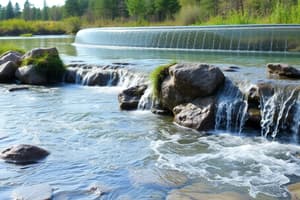Podcast
Questions and Answers
What percentage of the Earth's water is considered fresh water?
What percentage of the Earth's water is considered fresh water?
- 5%
- 0.5%
- 2% (correct)
- 1%
Which process in the water cycle involves water vapor rising and cooling to form clouds?
Which process in the water cycle involves water vapor rising and cooling to form clouds?
- Condensation (correct)
- Precipitation
- Infiltration
- Evaporation
What is the primary source of energy that drives the evaporation process in the water cycle?
What is the primary source of energy that drives the evaporation process in the water cycle?
- Wind
- The sun (correct)
- Ocean currents
- Geothermal heat
What happens to precipitation that does not infiltrate the ground?
What happens to precipitation that does not infiltrate the ground?
Which of the following best describes the water table?
Which of the following best describes the water table?
Flashcards
Percentage of Earth's surface covered by water
Percentage of Earth's surface covered by water
About 71% of the Earth's surface is covered with water.
Type of water in oceans/seas
Type of water in oceans/seas
Mostly saltwater, making up over 97% of Earth's water.
Main source of water cycle energy
Main source of water cycle energy
The sun's heat drives evaporation, starting the water cycle.
Evaporation, definition
Evaporation, definition
Signup and view all the flashcards
Condensation in water cycle
Condensation in water cycle
Signup and view all the flashcards
Study Notes
Water Surrounding the Earth
- Earth is often called the "Water Planet" or "Blue Planet" due to the abundant water.
- 71% of Earth's surface is covered by water.
- 97% of the Earth's water is saltwater found in oceans and seas.
- 2% of Earth's water is glacier ice.
- Less than 1% of Earth's water is freshwater found in rivers and lakes.
- Major water reservoirs include the Pacific, Atlantic, Indian, and Arctic Oceans.
The Water Cycle
- Earth receives most fresh water through rainfall.
- Fresh water also comes from numerous springs and rivers.
- Water constantly cycles, with no beginning or end.
- The sun's energy causes evaporation of water from oceans.
- Evaporated water forms clouds through condensation.
- Condensed water falls as precipitation (rain, snow, hail).
- Precipitation flows into rivers, infiltrates the ground, or is absorbed by the soil.
Studying That Suits You
Use AI to generate personalized quizzes and flashcards to suit your learning preferences.




